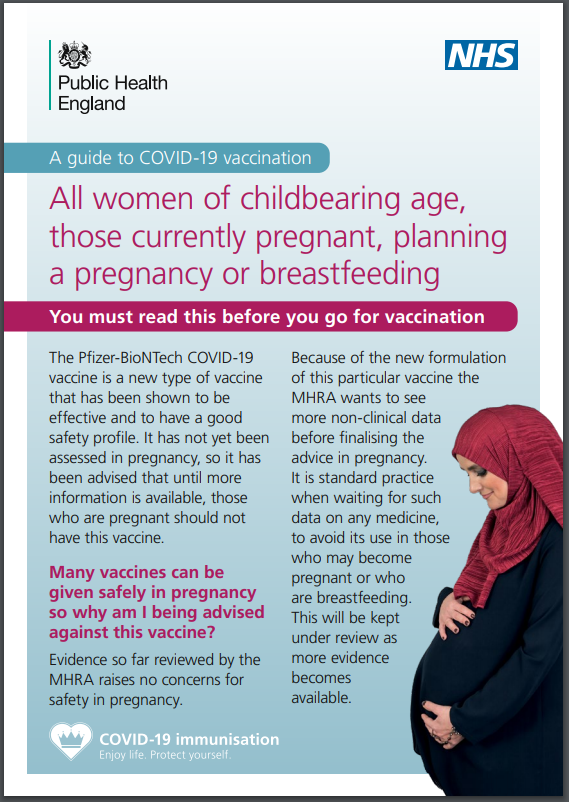The latest version published 9th December 2020, updates include gestational age ranges updated to reflect current guidance. View the updated guidance here
Monthly Archives: December 2020
Guidance for maternal medicine services in the coronavirus(COVID-19) pandemic – updated to v2.5
Updates from 9th December 2020 include incorporating RCOG ‘Guidance on self-monitoring of blood pressure in pregnancy’ into this document, and clarification that oral glucose tolerance tests should be the default screening method for gestational diabetes in pregnancy. View the updated guidance here
Advising on medicines regimens during breastfeeding – Specialist pharmacy service advice
Supporting pregnant women using maternity services during the coronavirus pandemic:Actions for NHS providers
NHS England have produced new instructions for maternity services.
“It is therefore our aim, further to a risk assessment, that a woman should have access to support from a person of her choosing at all stages of her maternity journey and that all trusts should facilitate this as quickly as possible”
NHS England 14.12.2020
View the briefing here
Ockenden review of maternity services at Shrewsbury and Telford Hospital NHS Trust
This review of maternity services at Shrewsbury and Telford Hospital NHS Trust independently assesses the quality of investigations relating to newborn, infant and maternal harm at the trust.
This report covers the emerging themes and trends identified from 250 fully assessed cases. It makes system-wide suggestions and recommendations for action to improve maternity care.
Download the report here
COVID-19 medicines guidance: Obstetrics and gynaecology
Specialist Pharmacy Service has produced a webpage which summarises and signposts to medicine related guidance they are aware of from professional and government bodies relating to coronavirus and obstetrics and gynaecology.
View the SPS page here and the UK Tetralogy Information Service page on medications used to treat COVID-19 in pregnancy here
Maternal, Newborn and Infant Clinical Outcome Review Programme – Perinatal surveillance report 2018

This report focuses on the surveillance of perinatal deaths from 22+0 weeks gestational age (including late fetal losses, stillbirths, and neonatal deaths) of babies born between 1st January and 31st December 2018. The report finds that in the UK there has been a reduction in all three mortality rates: 15% in the stillbirth rate, 11% in the neonatal mortality rate and 16% in the extended perinatal mortality rate, across the six years of the MBRRACE-UK programme.
Download the report here
Perinatal Mortality Review Tool – Second Annual Report- when babies die

This report presents data from the 3,693 reviews which were completed between March 2019 and February 2020 following on from the first annual report published in 2019. Download the full report here
Supporting women and their partners through prenatal screening for Down’s syndrome, Edwards’ syndrome and Patau’s syndrome
Consensus statement on pregnancy screening from the Royal College of Obstetricians and Gynaecologists, Royal College of Midwives, Society and College of Radiographers.
From Spring 2021, non-invasive prenatal testing will be offered as an additional option, for women in England who have a higher chance (1 in 2 to 1 in 150) of having a baby with Down’s syndrome, Edwards’ syndrome or Patau’s syndrome, following combined or quadruple screening in single and twin pregnancies.
Read the consensus statement here
The safety of COVID-19 vaccines when given in pregnancy
Public Health England have published advice for health professionals on pregnant women who are inadvertently vaccinated against coronavirus (COVID-19), chicken pox (varicella), shingles or measles, mumps, rubella.
View the updated advice here
There is also detailed information on the safety of COVID-19 vaccines available here
“There is no known risk with giving inactivated virus or bacterial vaccines or toxoids during pregnancy or whilst breast-feeding. If a COVID-19 vaccine is given to a pregnant woman, she should be reassured that the vaccine does not contain live SARS-CoV-2 virus and therefore cannot cause COVID-19 infection in her or in her baby. Some COVID-19 vaccines contain a different harmless virus to help deliver the vaccine – whilst this virus is live, it cannot reproduce and so will not cause infection in a pregnant woman or her baby.”
The safety of COVID-19 vaccines when given in pregnancy, PHE 18.12.2020
NICE Draft Guidance consultation: Neonatal infection: antibiotics for prevention and treatment
NICE is seeking opinions on this DRAFT guideline covering preventing infection within 72 hours of birth in healthy babies, treating pregnant women whose baby is at risk, and caring for babies with suspected/confirmed infection. It aims to reduce delays in treatment and prevent unnecessary use of antibiotics.
The consultation closes on Tuesday 5 January 2021 at 5pm. View the draft guideline and see how to contribute here
COVID-19 vaccination: women of childbearing age, currently pregnant, planning a pregnancy or breastfeeding

Public Health England have published information for all women of childbearing age, those currently pregnant, planning a pregnancy or breastfeeding on coronavirus (COVID-19) vaccination.
Download the document and leaflet here
